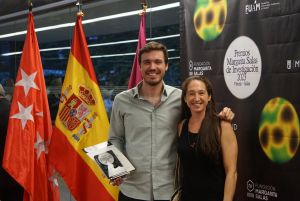La importancia de la sensibilidad colateral
Su tesis se ha centrado en uno de los grandes problemas de salud pública, la resistencia bacteriana a antibióticos, un problema agravado en las últimas décadas debido a la aparición y propagación de microorganismos multirresistentes. Entre ellas, destaca Pseudomonas aeruginosa, un patógeno oportunista, que infecta con frecuencia a pacientes hospitalizados, es poco sensible a muchos antibióticos y tiene una abrumadora capacidad para desarrollar resistencia a antibióticos por mutaciones, principalmente durante infecciones crónicas. Por tanto, se necesitan nuevas estrategias para tratar las infecciones producidas por este patógeno.
La investigación de Laborda ha explorado la sensibilidad colateral, un fenómeno por el que la adquisición de resistencia a un fármaco aumenta la sensibilidad a otro, un trade-off evolutivo que puede usarse para tratar infecciones mediante la combinación o el uso secuencial de parejas de antibióticos. Esta aplicación sólo es posible si la sensibilidad colateral se conserva en diferentes contextos genéticos, ambientes y situaciones.
Los resultados de su tesis permiten proponer nuevas estrategias de tratamiento de infecciones por P. aeruginosa, basadas en el uso racional de los antibióticos que ya tenemos, así como comprender mejor la evolución de la resistencia bacteriana a los antibióticos, y la identificación de sus “debilidades evolutivas” podría ser útil para el diseño de terapias anti-infecciosas que utilicen los antibióticos ya disponibles.
Laborda trabaja en la actualidad en Department of Clinical Microbiology, Rigshospitalet, en Copenhague (Dinamarca).
Premios Margarita Salas de Investigación
El Ayuntamiento de Madrid convoca los premios Margarita Salas de Investigación para galardonar aquellas tesis doctorales defendidas en universidades con sede en la Comunidad de Madrid, que sobresalgan por su excelencia científica, el interés y la repercusión científica del tema, así como las aplicaciones prácticas del contenido de la investigación. Los premios se reparten en las siguientes categorías: ciencias básicas, ciencias de la vida y ciencias medioambientales.
La tercera edición de estos premios ha ido dirigida a tesis defendidas y calificadas en alguna de las universidades de la Comunidad de Madrid entre el 1 de enero de 2021 y el 31 de diciembre de 2022.






